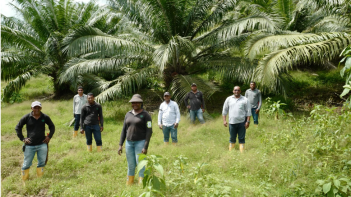Sterling year on year growth recorded in latest report
Three strategic pillars identified for 2012
Jakarta, 21 March 2012 – The Roundtable on Sustainable Palm Oil (RSPO), a multi-stakeholder organization that promotes sustainable practices in the palm oil industry, emphasized today that it will continue to focus on realizing its vision to transform markets to make sustainable palm oil the norm from this year on. This new vision was one of the key resolutions reached at RSPO’s annual 8th General Assembly (GA8), which was recently held in February and witnessed the highest ever presence from members all over the world in the history of the RSPO with 58% quorum.
Prof. Dr. Ir. Bungaran Saragih, RSPO Indonesian advisor and a former minister of agriculture in 2001-2004 cabinet, said that, “I am committed to the vision and mission of RSPO as it offers positive influence to the palm oil industry especially in Indonesia. And now with the results of GA8, the road ahead is clear and the RSPO will now work more unified than ever towards a collective goal to transform the markets to make the sustainable palm oil the norm.”
“The transformation of the market to establish CSPO as the norm is in a period of transition but we are confident that RSPO’s vision of making this the norm will be realized through commitment and collaboration.”
The emerging number of resolutions that were passed at the GA8 showed positive commitment from all of the players in the sustainable palm oil industry. With the new statements, RSPO will advance the production as well as the use of sustainable palm oil products. RSPO also will develop, implement, verify, assure and review the global standards for all of the players in the entire supply chain of sustainable palm oil.
Bungaran added, “Even though there were several resolutions that were not passed at the General Assembly, we appreciate them as the purpose of the GA8 itself was to facilitate the dialogue and engagement between various constituents that showed the eagerness to enhance the quality of sustainable industry.”
Not only RSPO membership showed an aggressive growth in the past year which increased by over 30%, the commitment of the RSPO’s members as well as the others players in the supply chain towards CSPO also reflected on the upward trend in the supply and sales of sustainable palm oil based on RSPO’s report for CSPO performance in 2011. After RSPO launched its certification for the palm oil commodity in 2008, the supply of CSPO has increased by 250 %, grew from 1,357,511 metric tons in 2009 to 4,798,512 metric tons in 2011.
According to the RSPO Report, 2011 RSPO CSPO Growth Interpretation Narrative (2011 GIN), the sales volume of CSPO has grown by 6 times or 620 % from 343,857 metric tons in 2009 to 2,490,526 metric tons in 2011.
The memberships of RSPO has also been increasing in 2011 whereas the membership of consumer goods manufacturer grew by more than 60 %, retailer category increased by 50 %, while the processors and traders category also increased more than 30 %.
“Based on the results of CSPO performance in 2011, RSPO implement its vision and mission statements by prioritizing on 3 strategic pillars for 2012 as part of our pursuit for transformation to make sustainable palm oil the norm,” Bungaran reiterated.
“The first strategic pillar will be to accelerating demands by attracting new membership and collaborating with the new demand markets such as India and China and also focusing on the processors and traders as well as consumer goods manufacturers and retailers.”
“The second strategic pillar will continue on production momentum through certification in large producer nations by focusing on engagement and outreach with governments, companies, associations, and also facilitate the quality development of smallholders and new frontiers.”
“The third strategic pillar will enhance the credibility and standards of RSPO for certification through the current review process of RSPO Principles and Criteria. RSPO will also addressing important issues such as GHG emissions and indirect land use change as well as New Planting Procedure and Supply Chain Certification’s guidance from RSPO; and also developing acceptance of RSPO for other schemes such as biofuel.” he concluded.
— End —
About RSPO
In response to the urgent and pressing global call for sustainably-produced palm oil, the Roundtable on Sustainable Palm Oil (RSPO) was formed in 2004 with the objective of promoting the growth and use of sustainable oil palm products through credible global standards and engagement of stakeholders. The seat of the association is in Zurich, Switzerland, while the secretariat is currently based in Kuala Lumpur with a satellite office in Jakarta.
RSPO is a not-for-profit association that unites stakeholders from seven sectors of the palm oil industry – oil palm producers, palm oil processors or traders, consumer goods manufacturers, retailers, banks and investors, environmental or nature conservation NGOs and social or developmental NGOs – to develop and implement global standards for sustainable palm oil.
Such multi-stakeholder representation is mirrored in the governance structure of RSPO such that seats in the Executive Board and project-level Working Groups are fairly allocated to each sector. In this way, RSPO lives out the philosophy of the "roundtable" by giving equal rights to each stakeholder group to bring group-specific agendas to the roundtable, facilitating traditionally adversarial stakeholders and business competitors to work together towards a common objective and make decisions by consensus.
For further information, please contact:
Anne Gabriel
Communications Director
T:+603-22012053
[email protected]
Desi Kusumadewi
RSPO Indonesia Director
T:+62 21 5794 0222
[email protected]
Keep reading

Access into prisma

Updated Trace Function in prisma

Call for Expression of Interest: Independent Investigation of a Complaint

Latin American Smallholders, Key Global Brands Gather in Peruvian Amazon to Advance Sustainable Palm Oil

RSPO Forum for Members and Certification Bodies 2025: Strengthening Capacities and Building Bridges with RSPO Members

From Violence to Prosperity: Cultivating Sustainable Palm Oil in San Pablo, Colombia

Palmas de Tumaco: Enduring, Trusting, and Transforming in Colombia’s Pacific Coast
Carry Over Credits for Certified Independent Smallholder Groups




